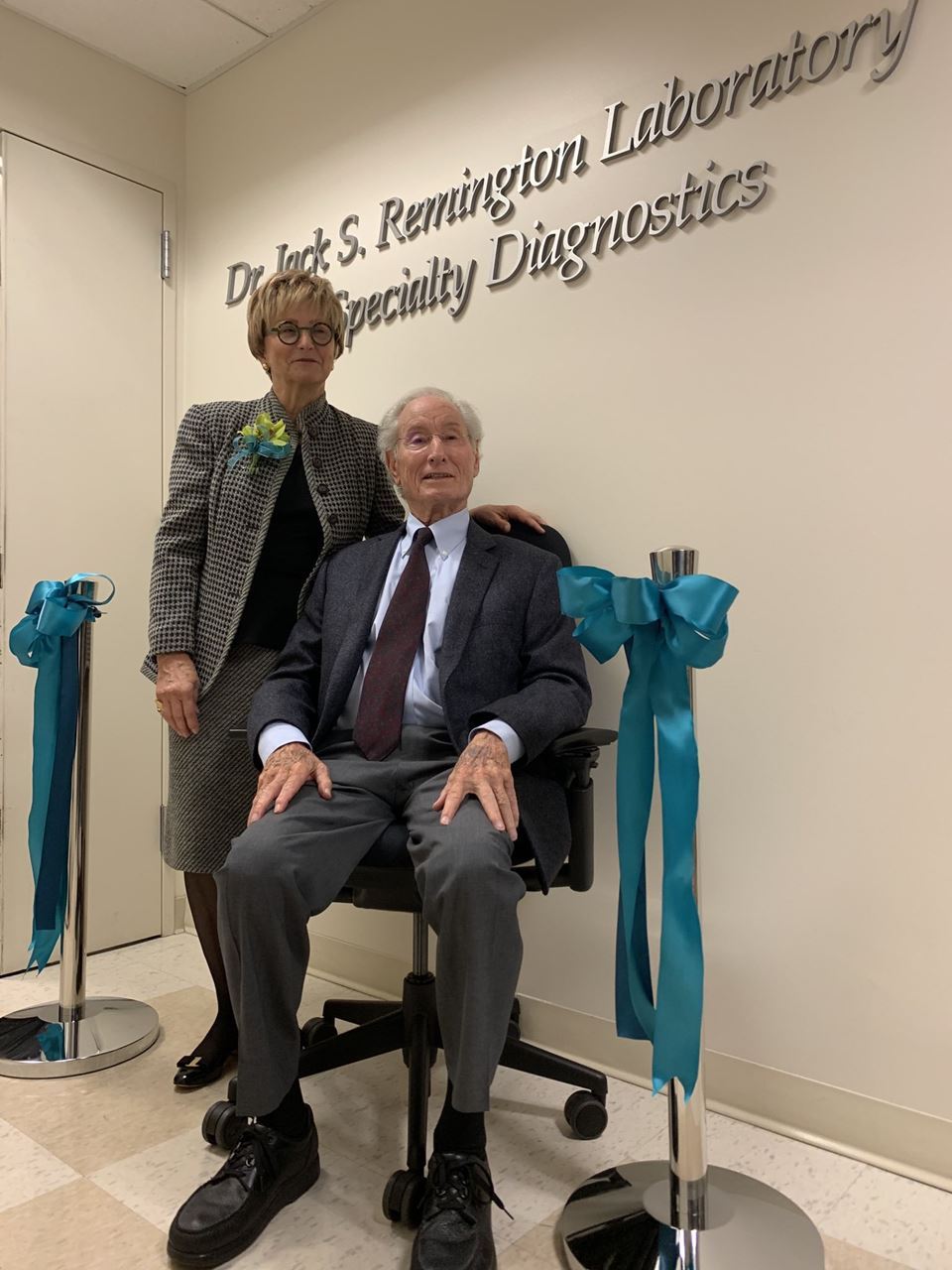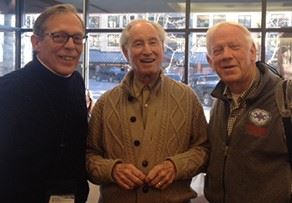
Dr. Jack S. Remington, 90, Physician-Scientist, “the Pope of Toxoplasmosis,” World-renowned Leader in Infectious Diseases, DiesDr. Jack S. Remington, who became a legend in the field of infectious diseases, made numerous medical discoveries, published more than 600 articles in peer-reviewed journals, and founded an internationally recognized laboratory for the study and diagnosis of toxoplasmosis, died at his home in Menlo Park, California on Thursday, April 8, 2021. His wife, Dr. Françoise Perdreau-Remington, said the cause was from complications following joint replacement for a fall-related hip fracture. Dr. Remington had undergone kidney transplantation 10 years ago, the organ having been donated by his wife. “STAT JACK,” as he was affectionally known by his trainees and colleagues, was born as a twin of his only sibling, Jill, on January 19, 1931 in Chicago, Illinois. He went to the University of Illinois for Medical School, University of California at San Francisco for medical internship and residency in internal medicine, the National Institutes of Health for an in-depth research program, and Harvard Medical School for an infectious diseases fellowship. In 1962, Dr. Remington simultaneously joined Stanford University, where he was a tenured Professor of Medicine, and the Palo Alto Medical Foundation Research Institute (PAMF-RI) where he founded the Toxoplasmosis Serology Laboratory (TSL) and became PAMF’s chief consultant in infectious diseases for over three decades. TSL was named the “Dr. Jack S. Remington Laboratory for Specialty Diagnostics” on November 8, 2019 at a special celebration and ceremony led by Dr. Joseph Lacy (then President, Palo Alto and Mills-Peninsula Divisions, Palo Alto Medical Foundation), chaired by Dr. José G. Montoya, and attended by his family, colleagues, former trainees and members of his beloved laboratory. Dr. Remington’s legacy is materialized in his numerous publications and scientific discoveries, and multiplied by more than 70 fellows who trained in his laboratory, PAMF, and Stanford hospital under him. Training under Dr. Remington was a great challenge to have. Everything had to be done with the utmost sense of urgency, hence the nickname “STAT JACK.” Friday laboratory meetings were both a delight and a “torture”. Dr. Remington would expect each fellow to present an update on their research. In addition to teaching fellows how to perform experiments, analyze data, and draw fact-driven conclusions, Dr. Remington taught them how to deliver presentations, including the appropriate placement of the podium, how to speak the language of science, and how to avoid the laser point cursor wandering around the screen. Under Dr. Remington’s vision and scientific wisdom, his fellows learned how to implement science, teach other scientists and physicians around the world, and treat patients with the utmost care and sensitvity, preparing them for leadership positions in academic infectious diseases. Dr. Remington’s legacy as a mentor to his fellows was materialized in a book, We Were Fellows, published in 2002. In this book, each fellow wrote about her/his life before, during, and after their training under Dr. Remington. We Were Fellows should be a reference book for any research mentor anywhere in the world Dr. Remington became a world-renowned physician-scientist who was passionate about chemistry and immunology. He was the first investigator to demonstrate the presence of immunoglobulins (antibodies) in human nasal secretions and sweat. He was the first to coin the term “immunocompromised host” in the field of infectious diseases, and the first to describe fungal infections in patients with leukemia and lymphoma, pulmonary infections in immunocompromised hosts, and intracranial infections in heart transplant patients. Dr. Remington was the first investigator to identify interferon gamma (INF-γ) as one of the major protections against intracellular pathogens. However, above all, he was committed to the search for the truth and what was best for his patients. He is recognized as a towering figure in the field of infectious diseases for his work in studying toxoplasmosis, a disease that can severely affect unborn babies and people with weakened immune systems; he became recognized in Europe and across the world as the “Pope of Toxoplasmosis.” Dr. Remington’s lifetime work on toxoplasmosis has resulted in a significant improvement in the health of pregnant women, newborns, children and immunocompromised patients in the United States and the world over. By doing basic science research as well as working with patients as a clinical investigator, Dr. Remington and his teams initiated, revolutionized and advanced the diagnosis and treatment of toxoplasmosis in these vulnerable patient populations. Often Dr. Remington’s findings were extended to other infectious diseases, which saw the benefit of his work beyond his beloved field of toxoplasmosis. Dr. Remington was the first investigator to describe and implement the concept that the detection of the IgM antibodies in the blood of the fetus or newborn could be used for the diagnosis of congenital toxoplasmosis because of the IgM’s lack of transplacental passage. In Europe, the IgM test used for the diagnosis of congenital infection became known as “the Remington test.” Dr. Remington and his team also were the first to describe that the parasite toxoplasma could be transmitted through a transplanted organ. Many lives have been saved thanks to the understanding of this key insight. Dr. Remington was the co-founder and editor of the book Infectious Diseases of the Fetus and Newborn Infant that, since 1976, has been a standard reference textbook in the subject. Infectious Diseases of the Fetus and Newborn Infant is being edited for its 9th edition. He also was co-founder and editor of Current Clinical Topics in Infectious Diseases that, from 1980 from 2002, became a classic textbook for clinical annual updates in infectious diseases. In 1974, Dr. Remington founded the “Winter Course in Infectious Diseases” (WCID). Only the most pre-eminent leaders in infectious diseases are invited every year to present in 30 minute-formats critical updates in the practice of infectious diseases. In the year 2021, WCID will host its 47th meeting. By inviting only the best in their area of expertise, WCID became one of the premier clinical infectious diseases meetings in the world. WCID’s mission is to provide evidence-based information to help infectious disease professionals in their decision-making as they treat patients with serious infections from all over the world. The WCID foundation accomplishes this through its annual meeting, scholarships for fellows, practice resources, digital educational activities and clinical information, as well as networking opportunities. WCID was named the “Remington Winter Course in Infectious Diseases” in 2007. Dr. Remington was a clinician extraordinaire in internal medicine and infectious diseases. Countless stories from all over the world detail his exceptional ability to diagnose patients with unsolved clinical illnesses. Through his direct patient care, Dr. Remington taught his trainees how to practice medicine with the highest standards and saved so many lives. Among many notable awards, Dr. Remington received the National Foundation for Infectious Diseases’ Maxwell Finland Award in the United States; the Alexander von Humboldt Scientific Award in Germany; an honorary diploma Dr honoris causa from L’Université Paul Sabatier de Toulouse in France; Award/Gold Medal, Dr.-Friedrich-Sasse-Foundation in Germany, the Osler Oration and Gold Medal from the Royal College of Physicians in the United Kingdom; Stanford University’s Albion Walter Hewlett Award, the Distinguished Career Achievement Award, International Immunocompromised Host Society (ICHS), and the Walter E. Stamm Mentor Award of the Infectious Diseases Society of America (IDSA). He was President of IDSA (1987-1988) and of ICHS (1988-1990). Beyond science and patient care, Dr. Remington was passionate about his family, fellows, music, and extreme sports including rock-climbing, skiing and wind surfing. In his late years he mellowed to playing golf. He was exposed to opera and the Art Institute of Chicago early in his childhood by his mother; he would always be embraced by emotion when listening to classical music and opera. During the last two decades of his life, Dr. Remington took on painting and was given the opportunity to produce monotypes at the Smith-Andersen Gallery in Palo Alto, California. Years after his divorce from his first wife, Lola, Dr. Remington met Dr. Françoise Perdreau-Remington at a scientific meeting in Sweden in 1986. They married in 1994 at the top of the mountains in Vail, Colorado. Françoise’s kidney donation 10 year ago allowed them to extend years of happiness including many trips to Françoise’s house in France and the perks associated with Françoise’s knighthood status. Dr. Remington is survived by his wife Françoise, children David Remington and Lynne Remington, Françoise’s children Matthieu Schumacher and Geraldine Strunsky, their five grandchildren (Aaron and Amanda Remington, Nathan Goldberg, Emilie Strunsky and Maximilian Schumacher), his godson Andrés Montoya, and their beloved cat Minouche. Dr. Remington, his wife, and his immediate family wished to have a private remembrance ceremony. In lieu of flowers, memorial donations may be sent to his laboratory, or a memorial tree may be planted with the National Forest Foundation. For donations to Dr. Remington’s laboratory: “Dr. Jack S. Remington Laboratory for Specialty Diagnostics” Donations should be made payable to “The Remington Laboratory Fund.” Dr. Remington will always be remembered for his contributions to science, exceptional mentoring, lives saved because of his work, articles, books and, above all, his caring and beautiful smile – even as he would say, “I don’t care how it is done as long as it is perfect.” |
|


